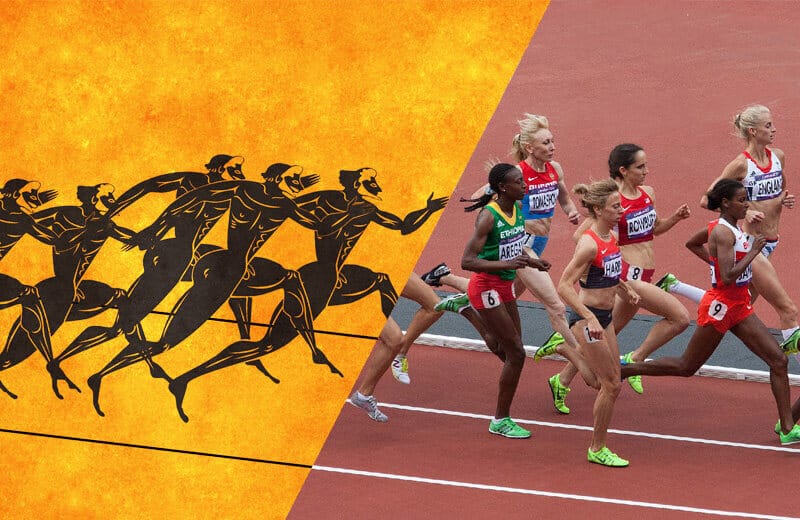The Games of the XXXII Olympiad take place in Tokyo this summer. Now an international competition focused primarily on athleticism, the games have evolved considerably from their roots in ancient Greece.
Only Greek men competed in the ancient Olympic games whereas the modern games include women athletes and athletes from many countries.
The Games of the XXXII Olympiad are scheduled to begin July 23 in Tokyo after being postponed for a year due to the COVID-19 pandemic. In anticipation of the triumphant return of this celebrated international event, read on to learn how the Olympics of ancient Greece differ from their modern counterparts.
1. The naked truth
Ancient Olympians competed in the nude. In fact, the roots of the word “gymnasium” rest in two Greek terms meaning “naked” and “place.”
2. Beyond physical training
The athletes of yore exercised not only their bodies, but their minds, including discussions of philosophy in their efforts. (USC commemorates this mind-body philosophy today with a Greek motto emblazoned on an archway near the athletic fields: “A healthy mind in a healthy body.”)
3. No holds barred
Whereas modern Olympic boxing, wrestling and martial arts adhere to strict rules, the pankration (pronounced “pan-KRAH-tee-own”) combined wrestling and boxing, and allowed nearly any move other than biting and eye-gouging.
4. A religious experience
The ancient game venue featured a plethora of temples dedicated to the ancient gods, including one that held one of the wonders of the world, a giant statue of Zeus made of wood, ivory and gold.
5. No girls allowed
In the ancient Olympics, only Greek men could compete. The modern Olympics feature both men and women international athletes — good news for competitors such as champion beach volleyball player (and USC Dornsife political science major) Tina Graudina.
Watch the video below to learn more.
Special Dornsife Dialogues Olympic event
Be sure to attend the next Dornsife Dialogues event, “Olympic training during a pandemic — and how the Games have changed since 776 B.C.,” on June 25 at noon.
History and archaeology major Sean Silvia, host of “Door to Dornsife” and “Archaeologists Anonymous,” interviews Graudina, Vincent Farenga, professor of classics and comparative literature, and Lucas Herchenroeder, associate professor (teaching) of classics. They’ll take a deeper look at the similarities and differences between the modern and ancient Olympic games as well as what it’s like to train during a pandemic.
If our reporting has informed or inspired you, please consider making a donation. Every contribution, no matter the size, empowers us to continue delivering accurate, engaging, and trustworthy science and medical news. Independent journalism requires time, effort, and resources—your support ensures we can keep uncovering the stories that matter most to you.
Join us in making knowledge accessible and impactful. Thank you for standing with us!

